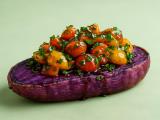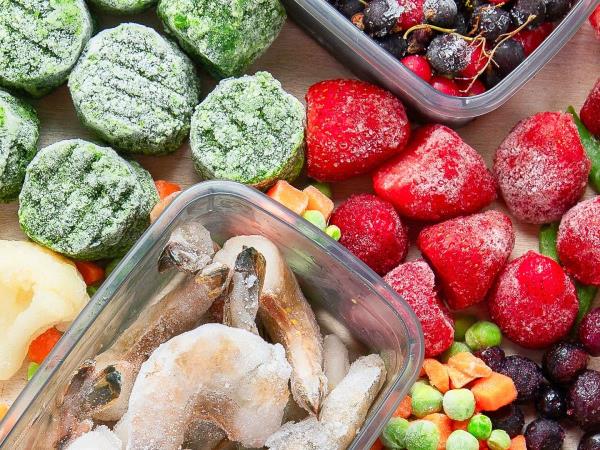Frozen food has a questionable reputation, which is sometimes unjustified and sometimes not. In any case, be careful. Find out why and when?
1. Frozen food is not a new invention, but today it is of better quality than ever before
Although it may seem like a modern invention, freezing food is an ancient practice. Millennia ago, in ancient China, people simply stored food outside during winter when temperatures were low. In a more modern form, freezing food became popular in the 20th century - credits for this go to Clarence Birdseye, an American researcher who developed a quick freezing method for fish in 1924. His method allowed food to retain almost all its texture, flavor, and - most importantly - nutrients.
Today, freezing technology allows food to stay fresh for up to 12 months without the need for added preservatives. And what's even more important - even home freezers (though not as fast as industrial ones) can do their job very well.
2. Frozen food can contain even more nutrients than fresh ones
This might surprise you - but several studies have shown that frozen vegetables are often more nutritious than those that have been "fresh" on the shelves for days. Why? Simple. Vegetables and fruits intended for freezing are usually picked at their peak ripeness, when they contain the most vitamins and minerals. They are then quickly frozen (sometimes within just a few hours), preventing nutrient breakdown.
On the other hand, "fresh" vegetables transported for several days (sometimes weeks) often lose between 15 to 77% of vitamin C, one of the most sensitive vitamins (source: University of California, Davis).
A study from the Journal of Food Composition and Analysis (2017) showed that frozen blueberries, carrots, broccoli, and spinach are often comparable or even more nutritious than their fresh counterparts after a few days in the fridge.
3. Frozen does not mean less safe - quite the opposite!
Many people fear that frozen food can be dangerous. In reality, it is one of the safest ways to store food. Why? Bacteria and other microorganisms cannot multiply at temperatures below -18{-15696}C, reducing the risk of food poisoning.
For highly perishable foods like fish, meat, and seafood, freezing is crucial. The European Food Safety Authority (EFSA) states that up to 20% of all food poisoning cases are related to improperly stored meat - but with correctly frozen products, these risks are almost eliminated.
Just be cautious not to thaw and refreeze food, as this can lead to bacterial growth again.
4. Time, money savings, and waste reduction
How many times have you gone to the store, bought fresh vegetables, only for them to end up in the trash after a week because you didn't use them on time? If you're like the average European, the answer is likely - often. According to the European Commission, each household throws away an average of 74 kg of food annually, which is a lot!
Frozen food offers a simple solution: take only what you need. The rest stays in the freezer, even for months. Additionally, you can buy in bulk when items are on sale, saving up to 20% on annual food costs in the long run, as shown by data from the British portal MoneySavingExpert.
The time spent preparing meals also decreases. Most frozen food is already washed, peeled, and chopped - meaning less work and fewer dishes.
5. What about additives, preservatives, and taste?
Frozen food often has a bad reputation for being full of "chemicals." But the truth is much more encouraging. Most frozen foods do not contain any additional preservatives. Why would they - as the low temperature itself preserves them.
Especially with frozen vegetables and fruits, it is almost always a 100% natural product without additives. However, the same rule applies to prepared meals as to fresh food - check the label.
Taste? It varies depending on the type of food. While frozen blueberries, peas, or spinach retain almost all their taste, the texture of some products (such as potatoes or zucchini) may slightly change. But with a good recipe and proper cooking, you will hardly notice.
Should you opt for frozen food more often?
The answer is: yes, but wisely. If you buy frozen food smartly and store it correctly, it can be an equally healthy, sometimes even more nutritious choice than fresh food. Moreover, it helps you save time, money, and reduce waste.
If you want to improve your diet, we suggest always having some basics in your freezer: frozen peas, corn, blueberries, broccoli, spinach, chicken fillets, and salmon. With these ingredients, you can prepare a healthy and tasty meal in less than 20 minutes.
And the next time you're looking at frozen vegetables in the store, remember: sometimes what's on ice is the hottest thing you can put on your plate.
Datum: 18. APR 25 - GOOD TO KNOW
5 things you need to know about frozen food
Is all frozen food healthy? Is the solution for quick but balanced meals hiding in the freezer? Hm ...
(FW)
 Would you like to be informed about news on the website?
Would you like to be informed about news on the website?
Just enter your e-mail
Frozen food quality
Nutrient-rich frozen food
Safe frozen food storage
Money-saving frozen meals
Natural frozen food options
|
Copyright (c) Foodwhisper.com March 2018 |
π | Contact: info@foodwhisper.com |
About us | Facebook |  |









